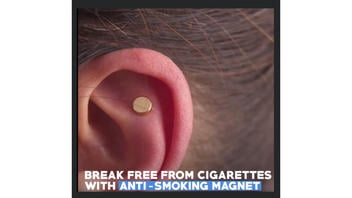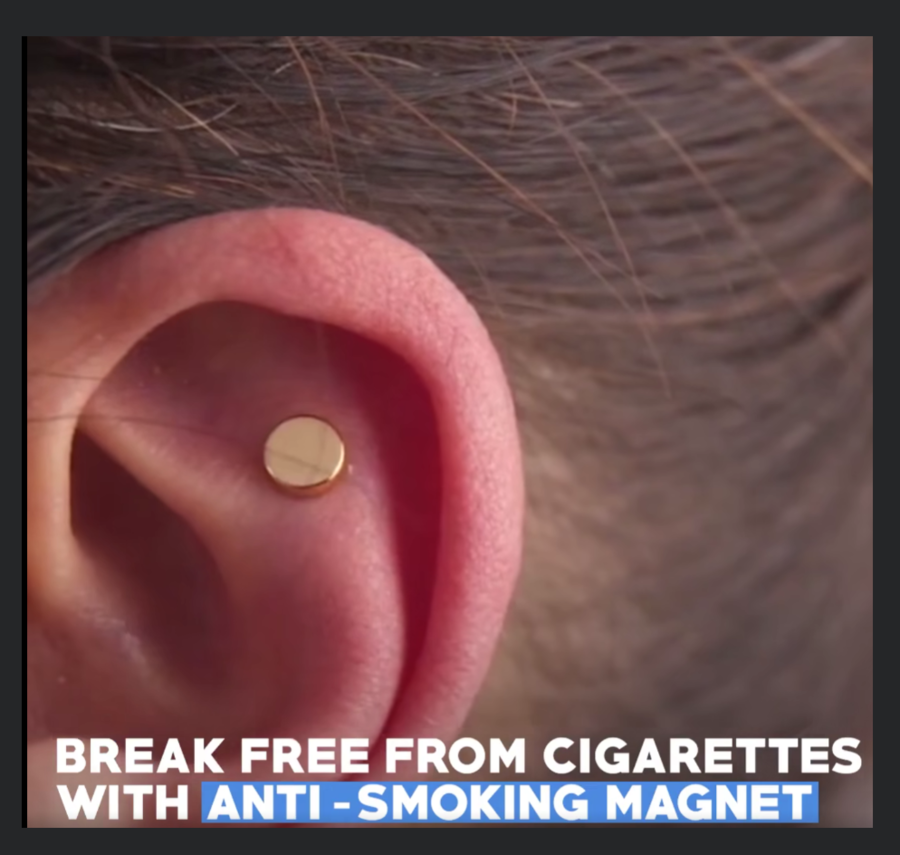
Has the FDA approved ear magnets as a smoking cessation product? No, that's not true: A social media post claimed such a device was a "Natural, FDA approved" method for people to quit smoking. A spokesperson for the Food and Drug Administration told Lead Stories on April 30, 2024, that they were "not aware of any acupressure magnets authorized for marketing as smoking cessation devices." The American Cancer Society notes there is "no scientific evidence to date to suggest that magnet therapy helps people stop smoking."
The claim appeared in a post (archived here) on Facebook on March 21, 2024. It began:
Discover How Magnetic Acupressure makes people quit smoking in a few days.
How does it work?? -- >
This is what the post looked like on Facebook at the time of writing:
(Source: Facebook screenshot taken on Tue Apr 30 15:54:58 2024 UTC)
The link in the post goes to the website SweetIntellect.com (archived here), which sells what it calls a "miracle anti-smoking magnet." The website does not offer any evidence that the product is "FDA approved."
A Food and Drug Administration (FDA) spokesperson told Lead Stories via email on April 30, 2024 that the claim was false:
The FDA is not aware of any acupressure magnets authorized for marketing as smoking cessation devices.
The FDA website does not contain any information that states magnetic acupressure is approved for smoking cessation (archived here).
The FDA website section titled Other Smoking Cessation Therapies cites a device (archived here) that is approved, noting, "The FDA has also given marketing clearance to a device using Transcranial Magnetic Stimulation (TMS) as an aid for short-term smoking cessation in adults." Such a device was developed by the company BrainsWay:
BrainsWay Deep Transcranial Magnetic Stimulation (Deep TMS™) is a safe and effective aid for short-term smoking cessation in adults, representing the first FDA clearance in the addiction space for any TMS device.
Using BrainsWay's patented H4 Coil, the treatment generates electromagnetic pulses that stimulate neurons in brain structures associated with addiction - specifically the bilateral insula and prefrontal cortex. BrainsWay Deep TMS is proven to reach wider and deeper brain regions than traditional TMS devices.
The FDA has approved electrical stimulation treatments for addictions other than smoking, such as a device that helped "to reduce the symptoms of opioid withdrawal" (archived here).
The American Cancer Society (archived here) notes that there is "no scientific data to suggest that magnet evidence helps people stop smoking":
Magnet therapy to quit smoking involves 2 small magnets that are put in a certain spot, opposite each other on either side of the ear. Magnetism holds them in place. There's no scientific evidence to date to suggest that magnet therapy helps people stop smoking. There are many on-line companies that sell these magnets, and they report various 'success' rates. But there's no clinical trial data to back up these claims.
Lisa Fucito (archived here) director of the Tobacco Treatment Service at Smilow Cancer Hospital in New Haven, Connecticut, told Lead Stories via email on April 29, 2024, that there is "no evidence" to support the claim that magnetic acupressure helps people stop smoking long-term:
The Cochrane Library reviewed the available evidence across numerous studies to determine if there might be a benefit of acupuncture for this purpose. This review was conducted about 10 years ago. The conclusion was that there may be some short-term benefit but no evidence to support long-term efficacy and if there is a benefit, likely to be smaller than evidence-based treatments. Well-controlled trials are needed to demonstrate its helpful and these studies can be hard to do.



















